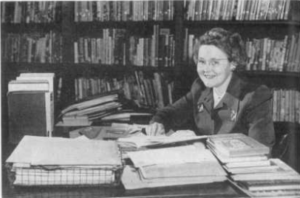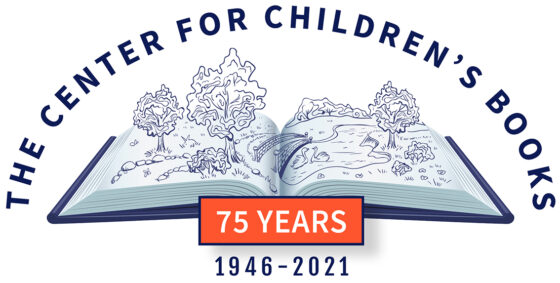
Both as an editor for the Bulletin and in later professional roles, Mary Katherine Eakin was an advocate for children’s education and literacy and shaped the practice of book reviewing.
After graduating with an AB (1943) from Drake University, Mary K. Eakin attended the University of Chicago Graduate Library School, earning a BLS (1946) and later an MA (1954). Hired as a Junior Reference Librarian at the University’s Reading Center, she joined Alice Brooks McGuire, Director of the Center for Instructional Materials, in producing the Service Bulletin. In 1949, the Center for Instruction Materials was renamed the Children’s Book Center, and Eakin became its director and editor of its Bulletin.
Eakin helped to establish the standards and practices for the Children’s Book Center. For example, she and McGuire emphasized children’s development stages as a primary reviewing lens for the Bulletin. Additionally, they decided that the Center would house a non-circulating collection accessible to students, teachers, and community members seeking “quality books for children.” Eakin also instituted the Center’s policy of retaining children’s books received by the Center for five years, after which time they were re-evaluated. Discarded books were sent to the Midwest Inter-Library Center, located nearby on the campus of the University of Chicago.1
As editor of the Bulletin, Eakin worked with an advisory committee of librarians and University of Chicago faculty, including Frances Henne, Sara Innis Fenwick, and Blanche Janecek, to produce each issue. Her reputation as an expert in contemporary children’s literature was solidified with the publication of multiple editions of the guidebook, Good Books for Children. Good Books for Children, as described by librarian and reviewer Rosemary Livsey, “marked definite and important trends in writing, publishing, and use of children’s books.”2
In 1958, Eakin left Chicago to become librarian of the Youth Collection at Iowa State Teachers College (now the University of Northern Iowa). She also served as an associate professor in UNI’s College of Education before retiring in 1971.3
In 1951, Eakin wrote, “When children do read, they should read books that are well-written and interesting.” This statement underscores the seriousness with which youth materials were evaluated at the Children’s Book Center. This attitude would continue to impact the trajectory of the Bulletin of the Center for Children’s Books.4
1 Mary K(atherine) Eakin,” in Gale Literature: Contemporary Authors (Gale: Farmington Hills, MI), 2002; Mary Eakin, “Judging Books for Children,” University of Chicago Magazine 44, no. 3 (December 1951): 10.
2 Rosemary Earnshaw Livesey, Review of Good Books for Children: A Selection of Outstanding Children’s Books Published 1948-57, by Mary K. Eakin, Library Quarterly 30, no. 1 (January 1960): 103.
3 Mary K. Eakin,” University of Northern Iowa Special Collections & University Archives.
4 Eakin, “Judging Books for Children,” 10.
